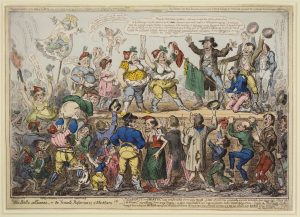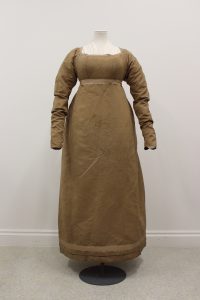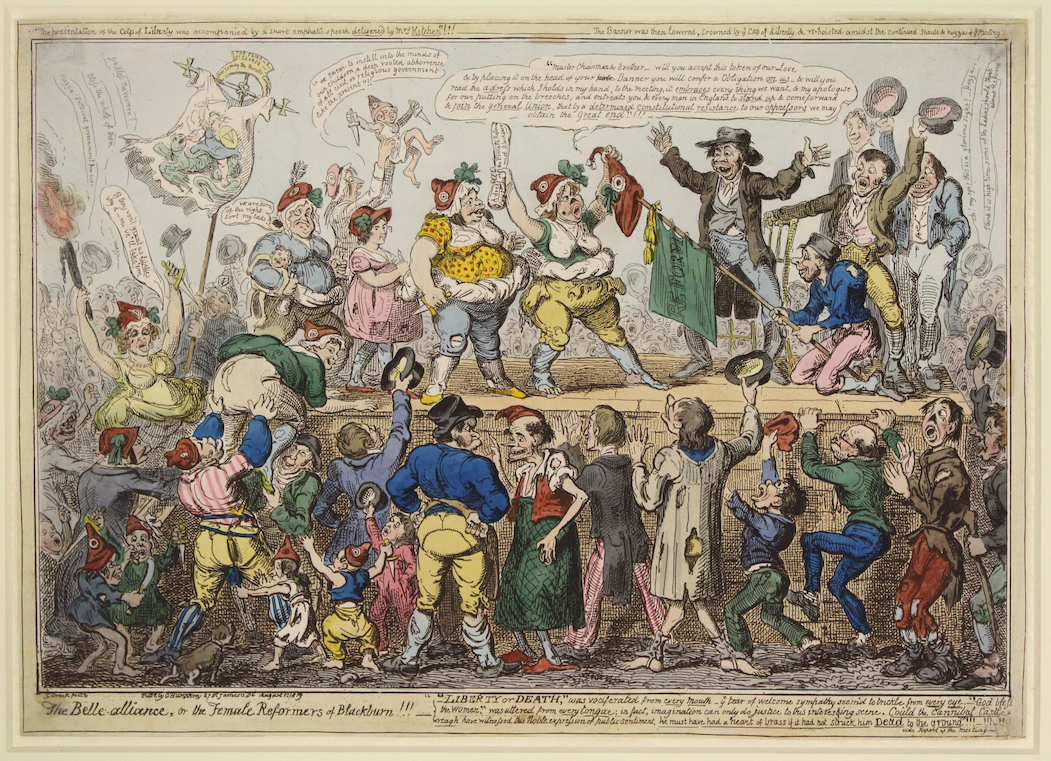
People’s History Museum in Manchester has opened an exhibition that tells the story that is at the very core of its being, and which represents a watershed moment in the history of our nation’s democracy. Disrupt? Peterloo and Protest begins with the telling of what happened on 16 August 1819, when 60,000 people gathered in the centre of Manchester in peaceful protest to seek rights and representation. Why representation meant so much, how this day would end in bloody violence, the actions carried out in the aftermath and the legacy 200 years later are all themes explored in the national museum of democracy’s exhibition.
Like the programme for the year, Disrupt? Peterloo and Protest takes visitors through the past, present and future of protest, beginning with the story of the Peterloo Massacre, which is told through original artefacts. PHM’s collection, newly acquired pieces, donations and loan items are brought together for the first time, some never having been on public display before, to tell this story in the year of the 200th anniversary of the Peterloo Massacre in The National Lottery Heritage Fund supported exhibition.
The working people of Manchester sought representation at a time when only around 2% of the population had the right to vote and Manchester did not have its own Member of Parliament (MP). Without representation they could not voice their concerns about falling wages and rising food prices. Yet those loyal to the government feared of the dangers they felt would be unleashed and the potential for revolution should rights be given to the working people, as the cartoon by George Cruikshank, Universal Suffrage or the Scum Uppermost (July 1819) highlights, to open the exhibition.
The fear that was felt by the authorities was heightened on Monday 16 August 1819, when after weeks of preparations, 60,000 people marched to St Peter’s Field, Manchester to hear radical orator Henry Hunt speak of the need for electoral reform. They travelled from across and beyond today’s Greater Manchester, some walking up to 30 miles, to be there. For two hours the authorities observed what took place, then the command came for the speakers to be arrested and the crowds to be dispersed.
The scene that unfolded as the local yeomanry drew their sabres is shown in a beautiful commemorative glass, whilst an oil portrait introduces Hugh Hornby Birley, who as captain of the Manchester and Salford Yeomanry, was the one who gave the orders for the local government forces to attack the crowds. Eyewitness reports also indicate that it was Birley himself who was responsible for many of the deaths and injuries of the men, women and children present.
The portrait, which has never been on public display before, has been donated to People’s History Museum (PHM) by Dr Rick Birley who says, “The failure of leadership, total lack of judgement, and a complete lack of experience, set against a basic class division and the need to uphold the establishment, led to the inexcusable violence. At a time when the masses relied upon the benevolence of the businessmen, the treatment they endured makes it little wonder that the cry of social reform and justice was becoming so loud during the 19th century.”
 Of the 18 people that died, three were women, which is reflective of the fact that witnesses spoke of the yeomanry explicitly targeting them. The white dresses worn by the women of the reform movements, made them particularly easy targets, and as a result around a quarter of the 700 people injured were women, despite them making up only 12% of the protestors. Mrs Mabbott’s dress (pictured) takes its place in the exhibition to represent some of the untold stories of the women of Peterloo. Mrs Mabbott herself wasn’t a protestor, but as the owner of a sweet shop on Bridge Street in the city centre, she was caught up in the chaos that swept across Manchester.
Of the 18 people that died, three were women, which is reflective of the fact that witnesses spoke of the yeomanry explicitly targeting them. The white dresses worn by the women of the reform movements, made them particularly easy targets, and as a result around a quarter of the 700 people injured were women, despite them making up only 12% of the protestors. Mrs Mabbott’s dress (pictured) takes its place in the exhibition to represent some of the untold stories of the women of Peterloo. Mrs Mabbott herself wasn’t a protestor, but as the owner of a sweet shop on Bridge Street in the city centre, she was caught up in the chaos that swept across Manchester.
In the weeks and months that followed what was to become known as the Peterloo Massacre, commemorative pieces were made to mark what had taken place, two of which are included in the exhibition. The Skelmanthorpe flag spent much of its early life being hidden from the authorities because of the reform messages that it held. The Peterloo commemorative medal may have been carried by its owner to show support for the cause of reform, whilst being easy to hide from view. With a particularly hostile and angry wording on the medal, this is the only one known of its type.
The connection of Peterloo to lives today, and current activism and campaigning, is told through a film specially commissioned for the exhibition in which a range of contemporary and familiar voices share personal perspectives. These include actor and activist Maxine Peake, journalist and presenter Krishnan Guru-Murthy, Greater Manchester Police Chief Inspector Tariq Butt and politician Angela Rayner MP.
The future of protest is placed in the hands of the individuals, communities and organisations for whom the exhibition’s Protest Lab has been conceived. This dynamic and highly active space will be used to create the campaigns of today, where individuals or groups can develop their ideas for collective action on contemporary live issues. The Protest Lab is also where an ever-evolving display of items will be exhibited that represents individuals’ expressions of creative disobedience and everyday activism, which have been submitted through open calls to the public.
Jenny Mabbott, Head of Collections & Engagement at People’s History Museum, says, “As the national museum of democracy we begin with the history of the Peterloo Massacre in our main galleries, from which so much of the evolution of our democracy stems. We’ve used this new exhibition to reflect and explore the story that led to and followed this tragic and pivotal moment in our history and, in doing so, we are acknowledging the sacrifices and time it sometimes takes to achieve change.”
PHM’s galleries cover over two centuries of the fight for representation; its visitors meet the revolutionaries, reformers, workers, voters and citizens who fought for rights and equality. Defining moments from Peterloo onwards are illuminated, including the suffragette movement and the development of the trade union movement, which were both born in Manchester, but were to define the lives of people all across Britain. The experience is enhanced for people of all ages with a host of interactive elements that make PHM one of Britain’s most Family Friendly museums.
People’s History Museum is open seven days a week from 10.00am to 5.00pm, Radical Lates are on the second Thursday each month, open until 8.00pm. The museum is free to enter with a suggested donation of £5. To find out about visiting the museum, its full exhibitions and events programme visit phm.org.uk.


